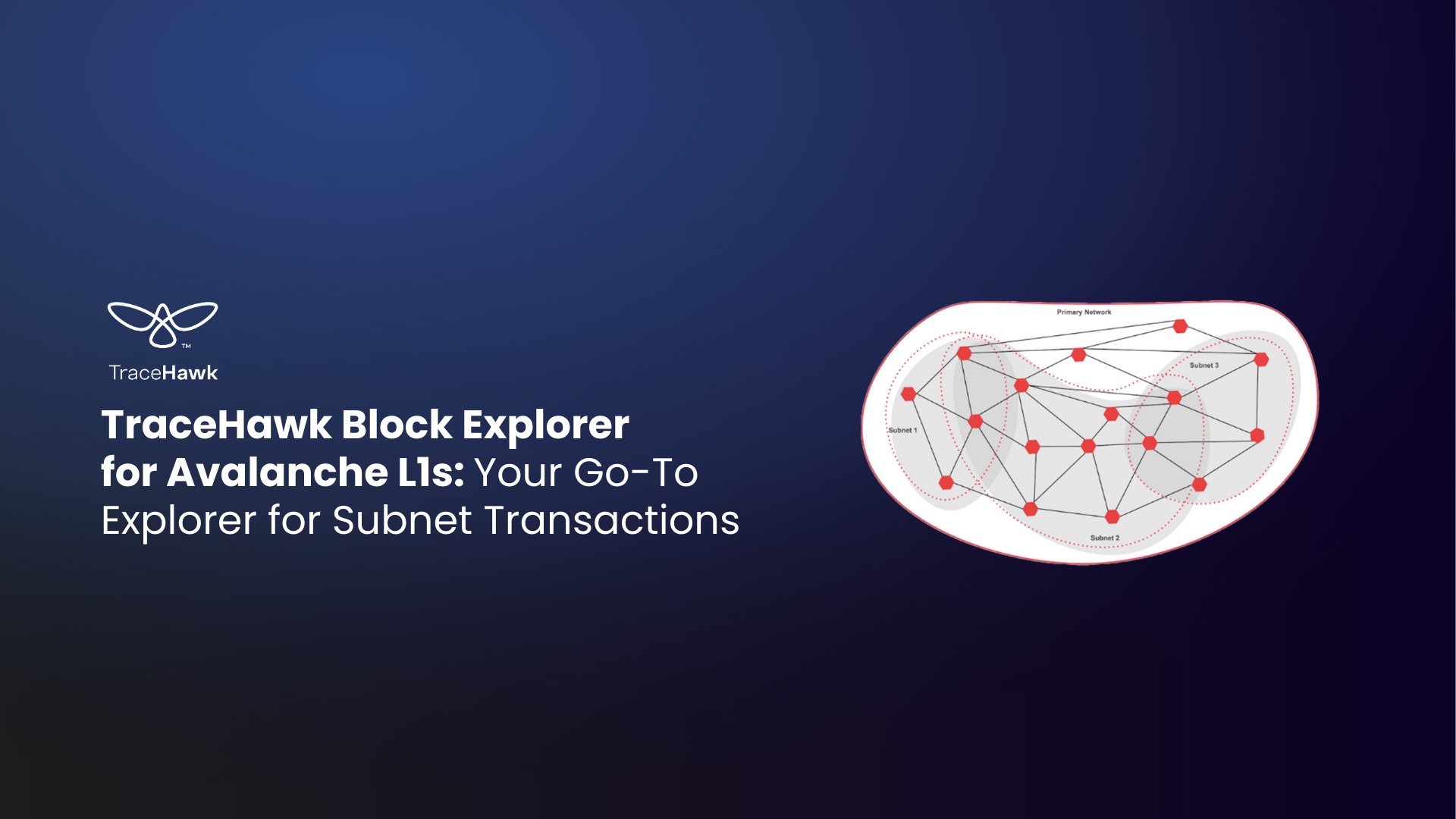TraceHawk for Avalanche L1s: Your Go-To Explorer for Subnet Transactions


TraceHawk is expanding block explorer support for Avalanche L1 (previously referred to as Subnets). Enterprises, startups, scaleups, and independent web3 projects building their application-specific Avalanche Layer1 can use TraceHawk as a network explorer with custom features and functionalities. After this critical addition, TraceHawk offers custom block explorer for all the leading appchains and rollups, such as Arbitrum Orbit, OP Stack, ZKsync Hyperchain, Polygon CDK, Polkadot Parachains, and Cosmos SDK.
This article highlights TraceHawk’s offerings for Avalanche L1. However, let’s quickly learn about Avalanche L1 as it’s quite a new concept.
Avalanche L1 is a sovereign appchain network that can define its own rules related to validators, tokenomics, operations, and more. Avalanche Layer1 includes a dynamic set of validators who are accountable to achieve consensus on the state of one or more blockchains. However, each blockchain must be validated exactly by one Avalanche Layer1.
Because Avalanche L1 has been rebranded from Avalanche Subnets, most of its aspects- from architecture to compliance, and staking parameters are the same as Subnets. If you want detailed information about Subnets, read the article below:
Why Build on Avalanche Subnets: Key Factors for its Adoption
TraceHawk block explorer for Avalanche L1 is designed especially to serve its application-specific requirements. Avalanche L1 networks can use TraceHawk to benefit from performance & availability, rich customization options, high-traction network support, APIs, tools, personalization, and many more features. Learn about all these features and TraceHawk’s offerings here.
TraceHawk offers a range of unique features for Avalanche Layer1. Let’s now discuss some of its main benefits:
Avalanche L1 deep dive:
TraceHawk, as your network’s block explorer will allow users on your Avalanche L1 to dive deeper and navigate through all the vital information, including:
Multi-Avalanche L1 support:
Built for the future, TraceHawk allows Avalanche L1 users to explore diverse chains building with Avalanche; be it P-chain, C-Chain, X-Chain or use case-specific chains building as Avalanche L1. For example, you can explore MELD L1, Beam L1, Shaprnel L1, etc to retrieve specific information from these networks.
Open-source design:
TraceHawk Avalanche L1 block explorer is created as a open-source project. This means, anyone in the web3 community can access TraceHawk, customize it, and use it to explore their preferred networks. Additionally, TraceHawk welcomes developers and contributors to suggest upgrades for features, integration, UI/UX, and so on.
Access to APIs and developer tools:
TraceHawk supports two popular and widely used APIs– Rust and Graph QL. Both these APIs are optimized for performance & availability and are designed to be easy-to-use. This allows all levels of developers and users on Avalanche L1 to utilize APIs and get their relevant data. Further, TraceHawk supports customization of these APIs to suit specific needs. Like, you can add custom endpoints, define API limits, or personalize its actions, etc.
AVAX (ERC token) and NFTs tracker:
The ‘Token’ feature in TraceHawk allows for seamless access of ERC-20 token data; AVAX in case of Avalanche L1 and NFTs. Based on your Avalanche L1’s requirements and features, you can filter token data for ERC-20, ERC-721, ERC-1155, or ERC-404. For each of these tokens, TraceHawk provides details like the token’s real-time price, market cap, token symbol, and total holders.
Gas tracker:
Knowing that gas usage tracking is an integral component for Avalanche L1s and other appchains, TraceHawk comes with a ‘Gas Tracker’ option on its dashboard. This will provide you information about gas usage– real time and historical consumption. Plus, you can see gas-related stats for different stages of the network- during slow, average, and fast network processing.
Quick smart contract verification:
TraceHawk replaces the complex process of smart contract verification with a hassle-free, one-click approach. To accommodate this, TraceHawk offers a low-code contract verification and publishing tool on its explorer’s interface. Avalanche L1 developers can now verify smart contracts quickly and authenticate the source code properly to utilize for their project.
Comprehensive analytics dashboard:
TraceHawk Avalanche L1 explorer comes with a real-time, 24/7 dashboard to present complex data in charts & graphs. The dashboard gives real-time as well as historical data for blocks, transactions, events, block time, gas usage, summarized details of daily/weekly transactions.
Explorer-as-a-service:
Explorer-as-a-service in TraceHawk eliminates the challenges of launching and managing a full-fledged Avalanche L1 block explorer. For this, TraceHawk offers a fully-managed and hosted block explorer where all the hassle of infrastructure maintenance, scaling, optimization, and uptime remains the accountability of TraceHawk’s team. Hence, Avalanche L1s will get a high-performance block explorer on their end with zero heavy lifting.
EaaS block at TraceHawk is also highly suitable for IaaS or Infrastructure-as-a-service platforms because of its great branding and customization options. Any IaaS provider supporting Avalanche L1 and other appchains can include TraceHawk as the default block explorer in their stack. This will save time & effort required for building and managing block explorers. Instead, projects deploying on their platform can plug-n-play TraceHawk’s standard explorer, or they can customize it as required.
Avalanche L1 is the latest addition to Avalanche. Although it was previously subnet, Avalanche plans to introduce a few important upgrades on it. This is encouraging for several enterprises and web3 projects that are looking to build appchain. If you plan to build Avalanche L1, TraceHawk can be your ideal block explorer solution. Try it now!
Also, if you want more details about TraceHawk’s offerings, customization, or features, connect with our experts. Schedule one-to-one calls or write your queries via email.
